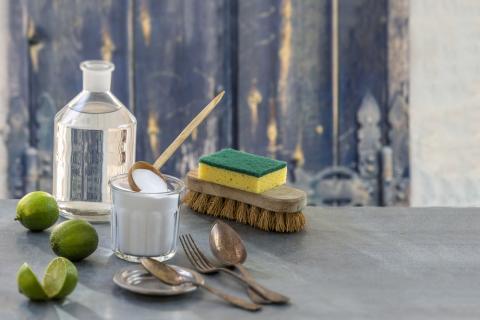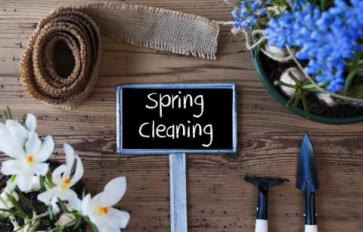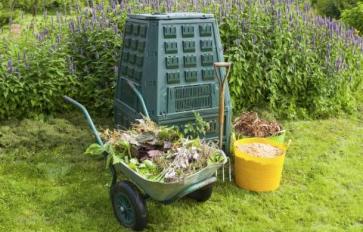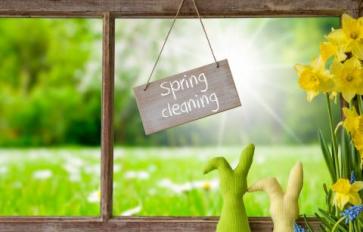
The products you use in your home matter. Even if you live a fairly healthy lifestyle (vegan, dairy-free, gluten-free, etc.), the products you use can really affect your life. Items we use around the house on the daily (such as cleaning products, hand soap, and plastic) can cause serious health concerns if you're not careful. You might not even be aware they're toxic until it's too late. Prevention is the best medicine though, so here's how to create a non-toxic home you'll be proud of.
Switch to non-toxic cleaning products
This switch seems simple enough but you might be surprised at the difference it can make. Instead of using all the brand name products, try switching to a more natural brand. You can also DIY cleaning products (my personal favorite is orange peel vinegar: It's an all-purpose cleaner that's made from only orange peels and white vinegar). If you want to make your own, here are 15 DIY household cleaners you might enjoy.
Upkeep your home
It's easy to be lazy and let go of maintaining your house. But if you set the intention to keep it up, it will ultimately make your life easier. A clean environment can make a big difference in your world: It influences how you feel emotionally and what you're physically able to get done. Make time to clean up a mess before it gets out of hand and things pile up. It will help you feel less overwhelmed. Not to mention a cleaner house is also a healthier one, so you're less likely to get sick. Set aside a day in your week to do a little upkeep, even if it's just for one hour. Tackle a disorganized bookshelf, go through your closet, or get rid of clutter on your desk. No matter what you decide to do, it will definitely make a difference in your home. Best of all, you'll immediately feel better afterwards.
Eliminate plastic and switch to glass
Trust me when I say glass is better than plastic. Plastic can leak chemicals into your water and food. Who wants that? Plus, it's ridiculously hard to recycle because there are so many different types of plastic (seven to be exact). Glass is simple and easy to recycle and reuse. Use empty glass jars (from salsa, coconut oil, or sauce jars) to hold leftovers, freeze food (yes, this is safe), and store bulk dry foods. As a bonus, your fridge and pantry will look absolutely amazing (totally Instagram worthy, too).
Switch to holistic medicine (where applicable)
I get it—some things, you need a pill for. There is a time and place for Western medicine. That said, we have so many options available to us that we should never limit ourselves to only this one. Before you reach for those over-the-counter drugs, try holistic medicine instead. Utilize essential oils and herbs in your everyday life. Essential oils can help with so many ailments and can be used to make various products like balms, salves, and ointments. They can lift your mood, calm you, or even energize you based on the scent. Herbs are also powerful natural healers: Herbs can help with everything from an upset stomach to improving digestion. My favorite herbs for general wellbeing are rosehips (immune support), chamomile (stress relief/sleep), Echinacea (fighting colds), St. John's wort (stress-relief), raspberry leaf (cramps) and peppermint (upset stomach). There are many other herbs I recommend exploring, but those are just a few. Having them in your pantry (dried) can really help in times of need. I recommend using dried herbs as a form of loose leaf tea for the best results.
Eat organic
Eating organic is so important: It's safer and more cost efficient than the price of illness. Most food is sprayed with pesticides and herbicides which not only contaminate the food, but the soil it's grown in. Also, genetically modified organisms (GMOs) are commonplace in the market now. A lot of farm animals have been genetically modified and injected with hormones to be bigger: This in turn produces more meat, keeping up with consumer demands. These poor animals are often unnaturally large (especially chickens) and can barely stand up right. There are so many problems with the way food is produced nowadays (both in the produce and meat industry), I can't even begin to explain it all. Suffice it to say organic produce and meat is a much better option. Look for the USDA organic label on all the food you buy: There's a very high standard set by the USDA for these foods. The USDA organic seal must contain no toxic and persistent pesticides, no petroleum-based fertilizers, no cloning, no synthetic growth hormones, no artificial preservatives, no GMOS, and no irradiated products or ingredients. This goes for food as well as organic beauty products too, by the way. That's why the USDA organic label is so important: It sets a standard and helps you eat foods that are non-toxic hassle free.








